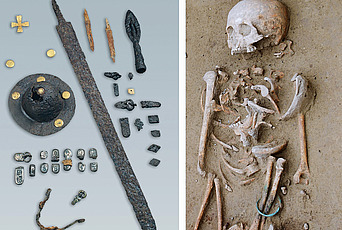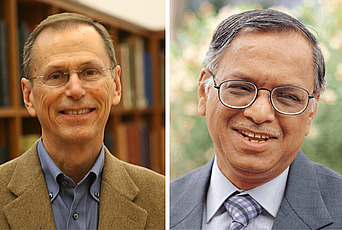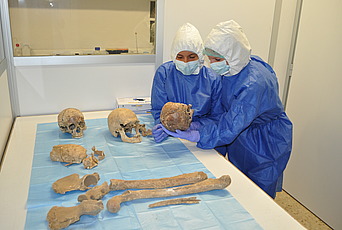€10 Million ERC Synergy Grant Awarded for Study of Medieval Populations
Press Contact
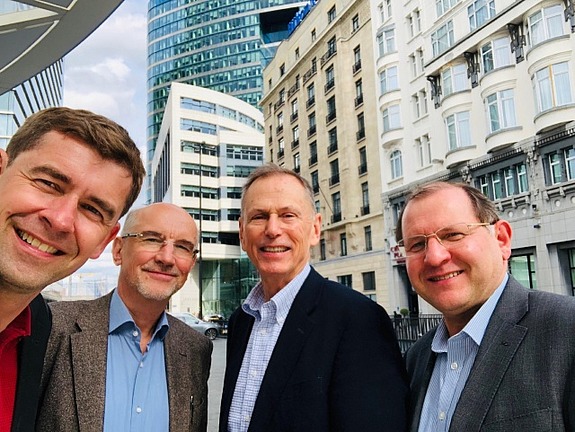
The Institute for Advanced Study (IAS) and its international partners have received a €10 million Synergy Grant from the European Research Council (ERC) to fund a multidisciplinary study of more than 100 medieval cemeteries located across central and eastern Europe. The project, HistoGenes, will seek to understand the impact of migrations and mobility on the population of the Carpathian Basin from 400–900 CE, based on a comprehensive analysis of samples from 6,000 ancient burial sites. HistoGenes will, for the first time, unite historians, archaeologists, geneticists, anthropologists, and specialists in bioinformatics, isotope analysis, and other scientific methods in understanding this key period of European history.
The team’s four principal investigators, representing these various disciplines, are Patrick Geary (Institute for Advanced Study, Princeton, USA), Johannes Krause (Max Planck Institute for the Science of Human History, Jena, Germany), Walter Pohl (Austrian Academy of Sciences, Vienna, Austria), and Tivadar Vida (Eötvös Loránd University, Budapest, Hungary). In the U.S., the research team includes Professor Krishna Veeramah, a population geneticist from Stony Brook University. Geary and Veeramah had previously led a pilot study, published in Nature Communications in 2018, which sequenced the genomes of entire ancient cemeteries to examine the relationship between the genetic background of these communities and the archaeological material left behind.
“I am extremely gratified by the confidence that the European Research Council has shown in my colleagues and myself in awarding us this grant. The size of the grant will make possible an extraordinary advance in both our understanding of Europe’s population during a crucial historical period as well as in developing new procedures to integrate natural scientific and humanistic scholarship in a common effort,” stated Geary, Professor Emeritus in the School of Historical Studies. “The early support for our pilot project, provided by the IAS, was crucial in demonstrating the feasibility of these new approaches, and thus paved the way for this award.”
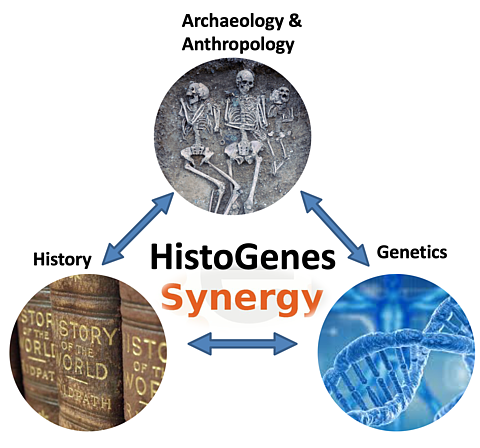
The core objectives of the project are to explore the impact of mobility on early medieval populations, refine the methods of archaeogenetic research, and establish a multidisciplinary model for future research.
According to a member of the ERC panel, “This project fuses cutting edge techniques in genetic testing with familiar archaeological and textual analysis to examine a half-millennium of migration and settlement in a crossroads region of Eurasia. It is big, original, methodologically sophisticated and will push the study of human history in new directions.”
The HistoGenes team is comprised of the world’s preeminent scholars, who are leading specialists in their fields. Geary’s work extends over a vast range of topics in medieval history, both chronologically and conceptually—from religiosity and social memory to language, ethnicity, social structure, and political organization. His essays and books remain standard literature in the field. Geary is a pioneer in applying the genomic revolution to obtain a deeper understanding of history. His most recent project studied the migration of European societies north and south of the Alps through the analysis of ancient DNA in Longobard-era cemeteries in Hungary and in Italy. Geary first joined IAS as a Member in the School of Historical Studies (1990–91) and was appointed to the permanent Faculty in 2012.
HistoGenes is among 37 research groups to receive funding from the ERC as part of its 2019 Synergy Grant competition, which supports the world’s top researchers to address the most complex research problems.
The ERC announcement can be found here.
About the Institute
The Institute for Advanced Study is one of the world's foremost centers for theoretical research and intellectual inquiry. Located in Princeton, N.J., the IAS is dedicated to independent study across the sciences and humanities. Founded in 1930 with the motto "Truth and Beauty," the Institute is devoted to advancing the frontiers of knowledge without concern for immediate application. From founding IAS Professor Albert Einstein to the foremost thinkers of today, the IAS enables bold, nonconformist, field-leading research that provides long-term utility and new technologies, leading to innovation and enrichment of society in unexpected ways.
Each year, the Institute welcomes more than 200 of the world's most promising researchers and scholars who are selected and mentored by a permanent Faculty, each of whom are preeminent leaders in their fields. Comprised of four Schools—Historical Studies, Mathematics, Natural Sciences, and Social Science—IAS has produced an astounding record of introducing new understanding and is responsible for undeniable progress across disciplines and generations, from the development of one of the first stored-program computers to the establishment of art history as a discipline in the United States. Among its present and past Faculty and Members are 34 Nobel Laureates, 42 of the 60 Fields Medalists, and 18 of the 20 Abel Prize Laureates, as well as many MacArthur Fellows and Wolf Prize winners.
